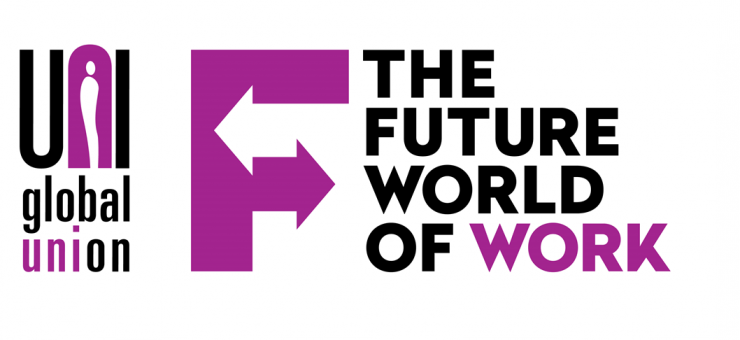UNI Global Union Leadership Summit on the Future World of Work

Follow and comment on twitter #FWoW
Six world-distinguished experts to come and share their research, points of view and experiences with us on the topic of the Future World of Work. As part of UNI Global Union’s Breaking Through strategy and leading up to our World Congress in Liverpool 2018, this Summit unites us to discuss the challenges and potentials that lie before us.
The summit is being moderated by BBC journalist Nomia Iqbal. Imagine a scenario where super intelligent machines had outsmarted us humans. Where an
emotionally intelligent machine had learnt to feel and can process 20.000 years of human thought ina week week after week. Imagine what we humans would be doing? And then think about the political and economic consequences. Are we ready?
We begin with what many of us still feel is Science Fiction: humans’emotional and intellectual interactions with machines, and machines emotional interaction with us. Where are we heading, and what does this potentially mean for power, politics and jobs?
We continue by focussing in on the new forms of employment that are arising in the digitalised and globalised world. How do we prevent that work becomes a commodity that can be exploited, bought and sold? How do we (re)empower workers, and what needs to change in our societies, businesses
and unions?
Speakers:
Maja Pantic is a Professor of Affective and Behavioral Computing and leader of the i·BUG group, working on machine analysis of human non-verbal behaviour and its applications to human-computer, human-robot, and computer-mediated human-human interaction. Maja has published over 250 papers in the areas of machine analysis of facial expressions, machine analysis of human body gestures, audiovisual analysis of emotions and social signals, and human-centered machine interfaces. http://ibug.doc.ic.ac.uk/maja/home/
Vanessa Evers is Professor at the University of Twente in the Netherlands. She is Chair of the Human Media Interaction group consisting of 40 scientists from various disciplinary backgrounds working at the intersection of intelligent systems and people. She is also the director of the University of Twente's DesignLab for Interdisciplinary research partnerships. Vanessa's research concerns human collaboration with intelligent and autonomous systems such as robots. She also investigates acceptance of AI technology and cross-cultural aspects of Human Computer Interaction. An acclaimed author with more than 100 peer publications, she is an advisor of the Dutch Government on AI and robotics in relation to safety, transportation, education, tourism, care and labour. http://hmi.ewi.utwente.nl/Member/vanessa_evers
Saadia Zahidi is a Member of the Executive Committee and Head of Education, Gender and Work at the World Economic Forum. Under her leadership, the Forum’s teams in these areas produce new insights, gather best practices, help set change strategies for businesses and governments and mobilize leaders to work together to drive progress. Saadia founded and co-authors the Forum's Global Gender Gap Report, Human Capital Report, Future of Jobs Report and several other publications. She was selected as one of BBC's 100 Women in 2013 and 2014 and won the inaugural FT/Mckinsey Bracken Bower Prize for prospective authors under 35. She is a member of the United Nations Secretary General’s High Level Panel on Women’s Economic Empowerment. Her book, Forty Million Rising, on womenomics in the Muslim world, will be released in 2017. https://www.weforum.org/agenda/authors/saadia-zahidi
Mark Graham is the Professor of Internet Geography at the OII, a Research Fellow at the Alan Turning Institute, a Research Fellow at Green Templeton College, an Associate in the University of Oxford’s School of Geography and the Environment, and a Visiting Fellow at the Department of Media and Communications in the London School of Economics and Political Science. He has published articles in major geography, communications, and urban studies journals, and his work has been covered by the Economist, the BBC, the Washington Post, CNN, the Guardian, and many other newspapers and magazines. He is an editorial board member of Information, Communication, and Society, Geo:Geography, Environment and Planning A, and Big Data & Society. He is also a member of DFID’s Digital Advisory Panel and the ESRC’s Peer Review College. https://www.oii.ox.ac.uk/people/mark-graham/
Robin Chase from Boston, America, is founder and former CEO of Zipcar, the largest car sharing company in the world, a cornerstone of the rise of the sharing economy. She has been policy advisor to cities, states and countries in the areas of transportation, innovation, cities and climate change. She has won many awards, including Time 100 most Influential People. Recently, Robin authored the book, Peers Inc: How People and Platforms are Inventing the Collaboration Economy and Reinventing Capitalism. Robin lectures widely, and has been frequently featured in the major media. http://www.robinchase.org/#every-day-create-the-world-you-want-to-live-in
Guy Standing is Research Professor at the School of Oriental and African Studies (SOAS), University of London. He is a founder member and honorary co-president of the Basic Income Earth Network (BIEN), an international non-governmental organisation that promotes basic income, whose members include economists, philosophers and other social scientists from over 50 countries. Guy’s most recent books are Basic Income: A Transformative Policy for India, with Sarath Davala, Renana Jhabvala and Soumya Kapoor Mehta, 2015, A Precariat Charter: From Denizens to Citizens 2014 and The Precariat: The New Dangerous Class 2011. Professor Standing was coordinating editor and main writer of the ILO’s Economic Security for a Better World, a global report issued in 2004. http://www.guystanding.com/research/current-projects

